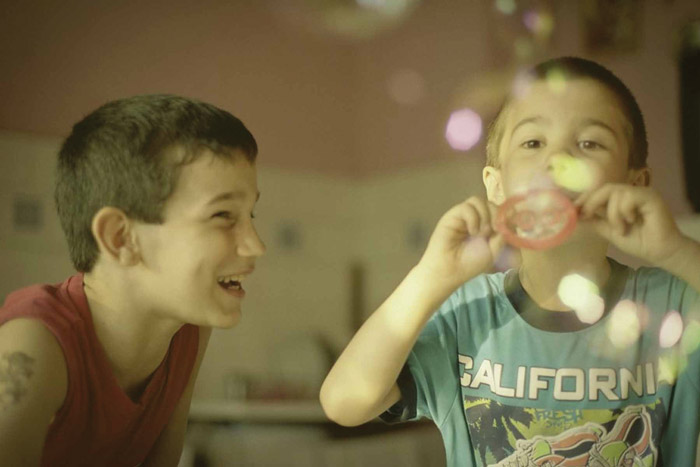Waiting for August, directed by Teodora Ana Mihai, tells the story of 15-year-old Georgiana and her six siblings, who live together in a Romanian housing project. The pack of children must adjust to life when their mother goes to Italy to find work and Georgiana takes on the role of both mother and sister. The daily struggles of Georgiana and her siblings are at times both touching and relatable. Yet the movie spends far too much time doting on the mundanities of domestic life to fill up its 90 minutes.
The colour scheme of the film is light and peachy, suggesting that this is a world inhabited and ruled by children. At times their lives seem normal, mundane, and culturally typical that you wonder why the subject is worthy of a documentary at all. For one of the children, his life revolves around what toys he does and does not have, just like a normal kindergartener. The children are blissfully unaware of their family’s circumstances and cry about not getting to eat an endless amount of ice cream, or not getting as many toys as they had hoped.
The signs of the children’s poverty are always present to us, yet they seem not to notice. The tiny, dilapidated apartment causes the scenes to appear cramped, creating a sense that there is always more movement and commotion going on just out of frame. It’s always a mystery as to how many people are packed into the one bed that they all share.
Like with most childhoods in the modern, globalized world, the presence of computer games, clothing, TV, and sweets isn’t lacking. Yet at other times, there are cultural peculiarities: While the older brother spends most of his time playing video games like a typical teenager, Georgiana spends most of her time cleaning and cooking.
While the concept had potential, there just wasn’t enough material for a 90-minute fly-on-the-wall documentary. We get tedious scene after tedious scene of Georgiana writing grocery lists, getting ready for school, cleaning, and cooking, as the younger children whine, shout, fight, and play. If the film succeeds in anything, it’s in presenting the universal nature of childhood—especially the remarkable ability of children to make a playground out of literally anything, including swinging from the top of the bedroom door.
Most of the film’s plot is in the grind of daily life. There is a sense that at any moment, a dramatic tragedy could unfold, before you realize that Georgiana mostly has things under control. There are strings of petty problems, though the larger problems seem to fizzle out.
In one scene, a nun threatens to send the children to an orphanage, claiming it’s not right to have them living without a mother. This causes distress for Georgiana—fear that she’ll be sent to an orphanage, questioning if her mother made the right decision. Ultimately, she is allowed to remain in the apartment. In another scene, Georgiana is found crying over failing to get the grade needed to get into a good high school, yet there is never a follow up on what high school she ends up going to.
While the film overall provides a solid narrative, its inability to add depth to the plot, choosing instead to focus on the humdrum and mundane, is ultimately its downfall.









